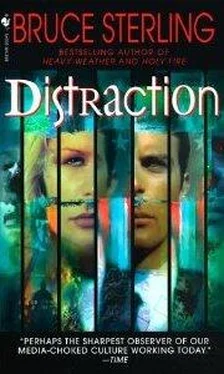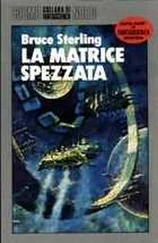But Oscar was a child of his own time, and he knew he didn’t have that luxury. He knew it was his duty to confront and master modern political reality. Political reality in modern America was the stark fact that electronic networks had eaten the guts out of the old order, while never finding any native order of their own. The horrific speed of digital communication, the consonant flattening of hierar-chies, the rise of net-based civil society, and the decline of the indus-trial base had simply been too much for the American government to cope with and successfully legitimize.
There were sixteen major political parties now, divided into war-ring blocs and ceaseless internecine purges, defections, and counterpurges. There were privately owned cities with millions of “clients” where the standard rule of law was cordially ignored. There were price-fixing mafias, money laundries, outlaw stock markets. There were black, gray, and green superbarter nets. There were health maintenance organizations staffed by crazed organ-sharing cliques, where advanced medical techniques were in the grip of any quack able to download a surgery program. Wiretapping net-militias flour-ished, freed of any physical locale. There were breakaway counties in the American West where whole towns had sold out to tribes of no-mads, and simply dropped off the map.
There were town meetings in New England with more compu-tational power than the entire U.S. government had once possessed. Congressional staffs exploded into independent fiefdoms. The execu-tive branch bogged down in endless turf wars in an acronym soup of agencies, everyone of them exquisitely informed and eager to net-work, and hence completely unable to set a realistic agenda and con-centrate on its own duties. The nation was poll-crazy, with cynical manipulation at an all-time toxic high — the least little things produced tooth-gritting single-issue coalitions and blizzards of automated lawsuits. The net-addled tax code, having lost all connection to fiscal reality, was routinely evaded by electronic commerce and wearily en-dured by the citizenry.
With domestic consensus fragmenting, the lost economic war with China had allowed the Emergency congressional committees to create havoc of an entirely higher order. With the official declaration of Emergency, Congress had signed over its birthright to a superstruc-ture of supposedly faster-moving executive committees. This desperate act had merely layered another operating system on top of the old one. The country now had two national governments, the original, halting, never-quite-superseded legal government, and the spasmodic, increas-ingly shrill declarations of the State-of-Emergency cliques.
Oscar had his own private reservations about certain policies of the Federal Democrats, but he felt that his party’s programs were basi-cally sound. First, the Emergency committees had to be reined in and dismantled. They had no real constitutional legitimacy; they had no direct mandate from the voters; they violated basic principles of sepa-ration of powers; they were not properly accountable; and worst of all, they had all been swiftly riddled with corruption. The Emergency committees were simply failing to govern successfully. They were sometimes rather popular, thanks to their assiduous cultivation of sin-gle-issue groups, but the longer the Emergency lasted, the closer they came to a slow-motion coup and outright usurpation of the Republic.
With the committees defanged and the State of Emergency re-pealed, it would be time to reform the state-federal relationship. De-centralization of powers had simply gone too far. A policy once meant to be fluid and responsive had turned into blinding, boiling confusion. It would be necessary to have a constitutional convention and abolish the outdated, merely territorial approach to citizen representation. There would have to be a new fourth branch of government made up of nongeographical nets.
With these major acts of reform, the stage would finally be set to attack the nation’s real problems. This had to be done without malice, without frenzy, and without repellent attacks of partisan histrionics. Oscar felt that this could be done. It looked bad… it looked very bad… to the outside observer, it looked well nigh hopeless. Yet the American polity still had great reserves of creativity — if the coun-try could be rallied and led in the right direction. Yes, it was true that the nation was broke, but other countries had seen their currencies annihilated and their major industries rendered irrelevant. This condi-tion was humiliating, but it was temporary, it was survivable. When you came down to it, America’s abject defeat in economic warfare was a very mild business compared to, say, twentieth-century carpet bombing and armed invasion.
The American people would just have to get over the fact that software no longer had any economic value. It wasn’t fair, it wasn’t just, but it was a fait accompli. In many ways, Oscar had to give the Chinese credit for their cleverness in making all English-language in-tellectual property available on their nets at no charge. The Chinese hadn’t even needed to leave their own borders in order to kick the blocks out from under the American economy.
In some ways, this brutal collision with Chinese analog reality could be seen as a blessing. As far as Oscar had it figured, America hadn’t really been suited for its long and tiresome role as the Last Superpower, the World’s Policeman. As a patriotic American, Oscar was quite content to watch other people’s military coming home in boxes for a while. The American national character really wasn’t suited for global police duties. It never had been. Tidy and meticulous people such as the Swiss and Swedes were the types who made good cops. America was far better suited to be the World’s Movie Star. The world’s tequila-addled pro-league bowler. The world’s acerbic, bipolar stand-up comedian. Anything but a somber and tedious nation of so-cially responsible centurions.
Oscar turned on the brown ribbed sands of the beach and began retracing his steps. He was enjoying being out of touch like this; he’d abandoned his laptop back in the krewe bus, he’d even left all the phones out of his sleeves and pockets. He felt that he should do this more often. It was important for a professional political operative to step back periodically, to take the time necessary to put his thoughts and intuitions into order and perspective. Oscar rarely created these vital little moments for himself — he’d somehow dimly intuited that he’d have plenty of time to develop his personal philosophy if he ever ended up behind bars. But he was giving himself some time for thought now, in this forgotten world of sand and wind and waves and chilly sunlight, and he could feel that it was doing him a lot of good.
An internal pressure had been building. He’d learned a great deal in the past thirty days, devouring whole reams of alien data in order to get up to speed, but hadn’t yet put it into an organized perspective. His data-stuffed head had become a disassembled mass of jumbled blocks. He was keyed up, tense, distracted, getting a little snappish.
Maybe it was just that long drought between women.
They were expecting Greta before noon. Negi had prepared a lovely seafood lunch for her. But Greta was late. The krewe ate lav-ishly inside the bus, popping corks and keeping up appearances, even joking about the no-show. But when Oscar left them, his mood had grown much darker.
He went into the beach house to wait for Greta, but the rooms that had once seemed louche yet charming now revealed themselves to him as merely sordid. Why was he fooling himself, taking such pains to imitate a love nest? Genuine love nests were places full of real meaning for lovers, full of things conveying some authentic emotional resonance. Little things, silly mementos maybe, a feather, a seashell, a garter, framed photos, a ring. Not these hired curtains, that hired bedspread, that set of fatally new antiseptic toothbrushes.
Читать дальше




